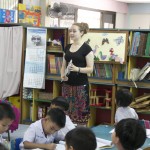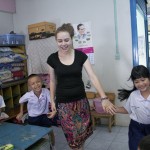I am born of Polish parents. I am an American citizen. I live in Canada, but I am a citizen of the world. It’s funny how things happen. Three years ago, I was introduced to the idea of a student exchange. I saw and heard so many things about students traveling abroad, and I made it my goal to experience an exchange on my own. I wanted to go somewhere completely foreign, someplace that no one I knew had gone before, so I chose Thailand.
From the very first moment I stepped onto Thai soil, Thailand became my home. I spent six weeks atThe Regents School in Pattayain boarding and I had the time of my life. I played basketball, did cross country running and played in their school band. I took weekend trips to pristine island resorts with my local friends and did a bicycle trip through the slums of Bangkok. Every weekend, I would get the opportunity to volunteer through different clubs in the school and help out at a local orphanage for handicapped children with my friends. In my boarding house alone, I met more people of diverse backgrounds than I could have imagined. I made friends from Bhutan, Lithuania, Armenia, South Africa and South Korea, just to mention a few. When it came time to leave, I felt like I was a movie character – as I looked out from the back window of the moving car on the way to the airport, all of my friends stood in a line, crying and waving goodbye. I, too, was in tears and didn’t want to leave.
Many people may say that their exchange was wonderful or enlightening, but my exchange experience changed my life. After having discovered a new exotic world and making unbroken friendships, I decided that my travel to Thailand would not stop there. I made it my goal to go back the next summer to see my friends, and on top of that I wanted to try something new and volunteer abroad. That’s when, with the help of my father, I found the Mercy Center and embarked on a four week independent volunteer trip to Bangkok’s biggest slum – Klong Toey, the “Slaughterhouse”.
I was extremely nervous because I was going to live by myself in a major city where crime and corruption was supposed to be very widespread. In the taxicab on the way to Mercy Center I obviously had thoughts racing through my head of, “Oh. Maybe I should turn around now. It’s not too late.” But chickening out was not the answer. I had traveled 26 hours and there was no turning back.
What really made me push forward, though, was the idea that I would be doing something useful and unique. The service I was going to do was not meant for me, but for the people in need. To turn back would be selfish and irresponsible.
Before I knew it, I was at the entrance of the Mercy Center, with a big purple suitcase in hand.The Mercy Centre, established by Father Joe Meier, is an emergency organization that takes care of families that have been exposed to human trafficking, rape, AIDs, sickness and any disaster. Many kids that live at the Mercy Centre are there because they have lost their families or were abandoned.
So I spent my summer working in the “Slaughterhouse”. The struggle started on my first day, when I was told that I would be teaching English to kids of all ages. Now imagine yourself in my position.This wasn’t a “read to your buddy for an hour” situation. I was a 15-year old girl that had to make a lesson plan before the next morning, get familiar with 20 students in my class and teach them. Oh yeah. I forgot to mention. None of them spoke a word of English and I had no idea how to speak Thai.
What made everything easier, though, was that all the kids were so sweet and wanted to help me do my best. They were super attentive and worked so hard in class – they really wanted to learn. After my first full day in the classroom, I was ecstatic. I loved my students and could not wait to see them the next day! When it was time for lunch for my pre-school students, I would go to the outdoor basketball court and play soccer on the smooth surface with the older local kids. I was really bad at soccer, but they still always let me play with them and taught me so many tricks.
Over my four weeks, I got the chance to work with kids from the ages of 6 to 18 and even worked on the organization’s farm outside of the city once a week.
There, I truly didn’t feel like I was doing community service, but living a normal life in a city that never sleeps.When I wasn’t working, I was spending time in the small alleyway home where I lived with eight Thai university students. I had only a tiny room with a bed and a fan, so with Thailand’s rainy season and 30+-degree weather, AC was something I had to learn to live without.
As you can imagine, it was truly a parallel world with a completely different culture, language and society rules but I soon blended in with the help of the locals’ open-mindedness and friendliness towards me.
In the end, my whole idea of this volunteer trip being only for the people in need was wrong. By the end of my trip I realized that the students I was teaching, helped me more that I could have imagined. They taught me responsibility, perseverance and acceptance. They accepted me as their teacher and they cared for me from day one.
I never imagined that going on an exchange would have done so much for me. Taking that chance three years ago helped me build a bond with the country and the people that I see myself revisiting for the rest of my life. I am going off to university next year, but I have promised myself that I will take at least six months of my four years in college and go back to the Mercy Center to live and volunteer full time.
The internationalism that I gained from going on exchange and volunteering abroad is immeasurable. Maybe you may never reach a stage in your life where you will visit a slum or go on an exchange, like I did. I feel at home in Thailand, but many people may not feel the same way. But I know that each and very one of you have the potential to do service in an environment that you feel comfortable in and grow to love.
I encourage all of you to step out of your comfort zone and take any opportunity you have to travel and help others while doing so. I can assure you that you won’t regret it, and it may just change your life. – Olga Jablonski (Pre-U ’14)
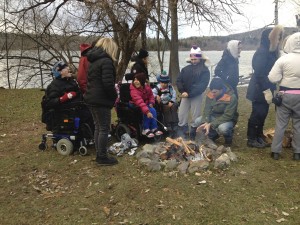 On November 18, several other students and I went on a life-changing trip with the Mackay Center to Camp Massawippi. On the first day of the trip we started to settle in, helping the kids unpack and making their beds. We went for a small hike around the camp, bonding with both the kids and the teachers who accompanied us. After a short walk, one of the kids, who I think is absolutely hilarious, had a problem with his wheelchair which was going extremely slow. So we turned back and went to the balcony next to the lake. We hung around listening to music and really just having a good time taking “selfies”.
On November 18, several other students and I went on a life-changing trip with the Mackay Center to Camp Massawippi. On the first day of the trip we started to settle in, helping the kids unpack and making their beds. We went for a small hike around the camp, bonding with both the kids and the teachers who accompanied us. After a short walk, one of the kids, who I think is absolutely hilarious, had a problem with his wheelchair which was going extremely slow. So we turned back and went to the balcony next to the lake. We hung around listening to music and really just having a good time taking “selfies”.
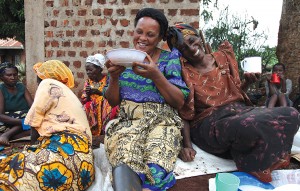
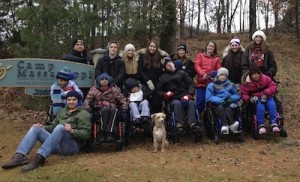
![photo[5]](http://wearelcc.ca/wp-content/uploads/2013/11/photo5-300x200.jpg)
